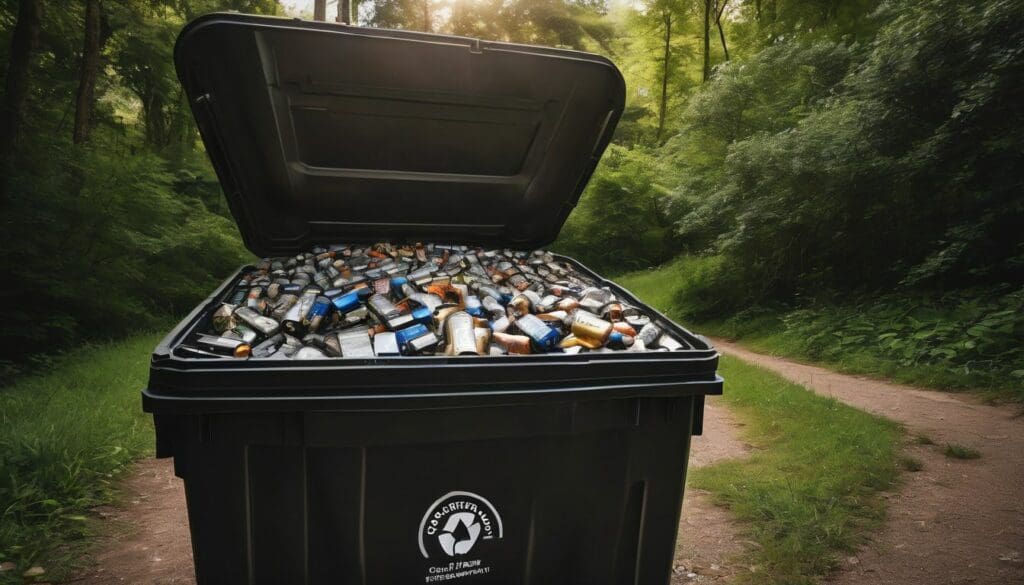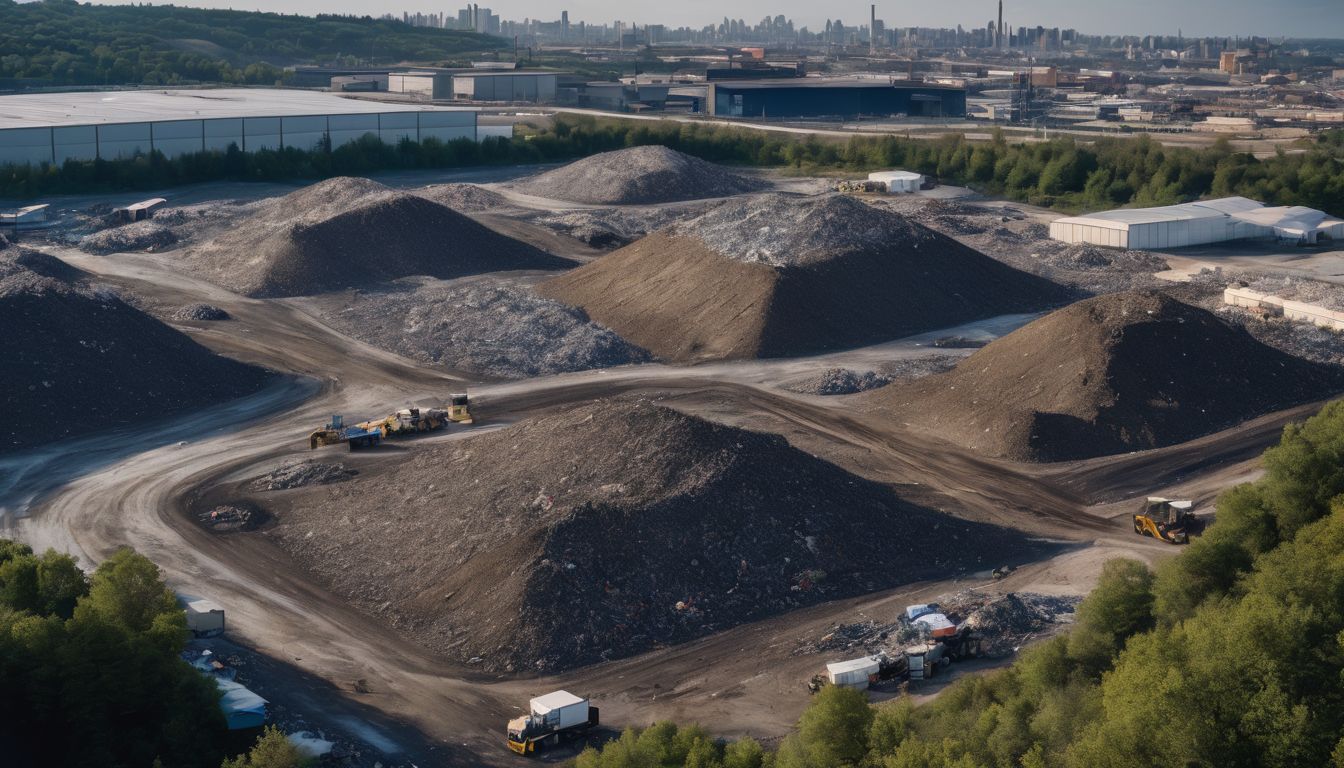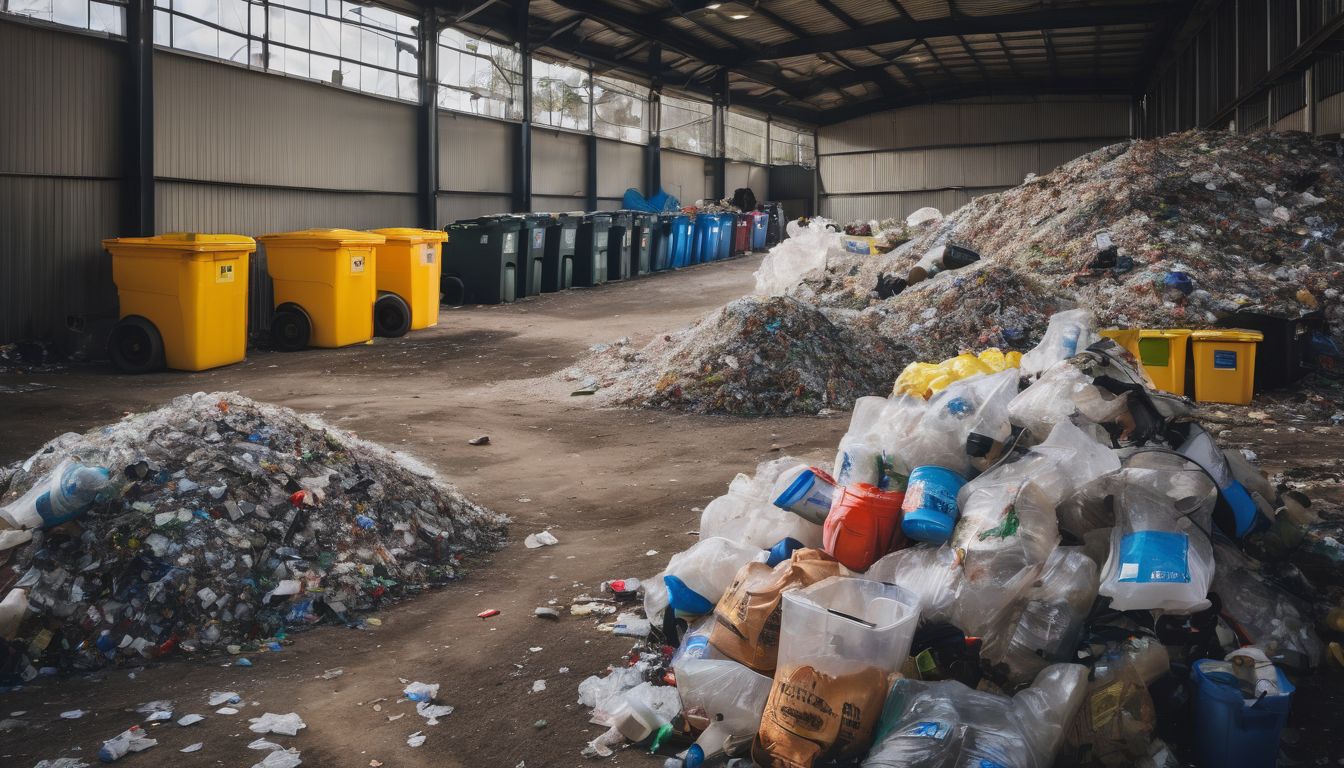Struggling with a pile of used batteries and not sure where to toss them? Every year, millions of batteries are disposed of incorrectly, causing harm to our environment. This article will guide you through the steps for eco-friendly battery disposal, ensuring you’re part of the solution rather than the problem.
Don’t bin it wrong; let’s get it right together!
Key Takeaways
- Always sort batteries into their correct types like dry cell, lead-acid, or rechargeable before disposal because each type has a specific eco-friendly disposal method.
- Find local recycling options for your batteries; tape the terminals of rechargeable ones and drop them off at designated collection points or recycling events.
- Regular alkaline batteries can often be thrown away with normal household trash if they have no special symbols on their labels indicating otherwise, but it’s best to double-check with local waste management first.
- Lithium-ion and nickel-cadmium batteries should never go in regular trash due to environmental risks; prepare these for recycling by taping up the terminals and taking them to proper facilities or programs.
- Contact your local waste management authorities to learn about battery disposal guidelines in your area, including any drop-off sites or special events that handle battery recycling.
Understanding Different Types of Batteries
There are various types of batteries, including dry cell batteries and automotive (lead-acid) batteries. Each type requires different disposal methods to minimise environmental impact.
Dry cell batteries
Dry cell batteries include the typical AA, AAA, C, D and 9V batteries that power many of our daily devices. These are commonly known as single-use batteries and contain materials that could harm the environment if not disposed of correctly.
Although you may have tossed these into your regular waste bin in the past, proper battery disposal means taking them to a battery collection programme or recycling facility.
To get started with eco-friendly disposal, gather all used dry cell batteries from around your home. Check for any damaged or leaking ones and place them in separate clear bags—this helps prevent any potential hazards during handling.
Next up, explore how we deal with automotive (lead-acid) batteries and ensure they too are disposed of responsibly.
Automotive (lead-acid) batteries
When disposing of automotive (lead-acid) batteries, it is crucial to handle them with care due to their hazardous nature. Take the batteries to a designated recycling centre or an auto parts store that accepts them.
Always wear protective gloves and eyewear when handling lead-acid batteries to prevent any contact with the corrosive acid inside.
Store the old lead-acid batteries in a secure, upright position during transportation to minimise spillage or leakage. It’s essential not to mix lead-acid batteries with other types of household waste as they require special recycling processes due to their toxic components.
Proper Disposal of Rechargeable Batteries
When it comes to rechargeable batteries, recycling is the best option for disposal. Look for local recycling options and prepare the batteries for recycling by taping over their terminals before dropping them off.
Recycling options
Explore battery recycling options in your area, as many local waste management facilities offer drop-off locations or special events for safe battery disposal. Look into dedicated battery recycling programmes that accept rechargeable and single-use batteries, ensuring they are handled responsibly.
By participating in these initiatives, you contribute to sustainable battery disposal and reduce the environmental impact of hazardous waste.
Seek out environmentally friendly practices for managing household battery waste, whether through established recycling programmes or safe disposal methods. Engaging in ethical battery disposal supports conservation efforts and promotes eco-friendly choices within your community.
Preparation for recycling
- Remove any battery from its device and place them in a plastic bag or individual containers.
- Tape the ends of lithium – ion batteries with insulating tape to prevent potential fires.
- Store batteries in a cool, dry place away from direct sunlight until they can be properly disposed of.
- Check your local waste management guidelines for any specific preparation requirements.
Disposal of Alkaline Batteries
When disposing of alkaline batteries, always check the battery label for specific disposal instructions. It is important to follow safe disposal methods to prevent any environmental harm.
Checking the battery label
Look for the battery label to determine if it’s alkaline. Check for the “Alkaline” symbol or wording on the label. This is crucial as alkaline batteries can be safely disposed of with regular household waste in most areas.
To check whether a battery is rechargeable, look for words like “rechargeable,” “nickel-cadmium (Ni-Cd),” “nickel metal hydride (Ni-MH),” or “lithium-ion (Li-ion).” Also, check for recycling instructions and symbols such as a crossed-out wheelie bin signifying that the battery should not be thrown in the trash.
Understanding these labels will help you make informed decisions about proper disposal methods.
Safe disposal methods
When disposing of batteries, always start by identifying the type of battery you have.
- Wrap non-rechargeable alkaline batteries in tape or place them in an individual plastic bag to prevent short-circuiting.
- Store used rechargeable batteries in a cool, dry place until you can properly dispose of them.
- For lithium-ion and nickel-cadmium batteries, check with local waste management for specific disposal instructions.
Disposal of Other Types of Batteries
When it comes to lithium-ion and nickel-cadmium batteries, special care must be taken when disposing of them due to their potential environmental impact. Be sure to research the proper disposal methods for these types of batteries in your area.
Lithium-ion batteries
Lithium-ion batteries power many of today’s portable electronics, including smartphones and laptops. When it comes to disposal, it’s essential to handle them with care due to their potential for environmental harm if not properly managed.
Recycling options are available for lithium-ion batteries, and preparation is critical before recycling. Checking with local waste management for drop-off locations or events can help ensure responsible disposal.
When disposing of lithium-ion batteries, look for designated collection points or take advantage of manufacturer-sponsored recycling programmes. Preparation involves protecting the battery terminals with tape and placing them in a plastic bag before dropping them off at the designated location.
Nickel-cadmium batteries
Nickel-cadmium batteries should not be disposed of in regular household waste. Take them to a designated recycling facility or a collection event for safe disposal. Be sure to check with local waste management authorities for drop-off locations and guidelines on how to prepare nickel-cadmium batteries for recycling.
By handling nickel-cadmium batteries responsibly, we can prevent hazardous materials from entering the environment and contribute to sustainable battery waste management. Before you dispose of these batteries, make sure you follow the appropriate steps and take advantage of available recycling options.
Next up, let’s explore Battery Disposal in Your Area.
Battery Disposal in Your Area
Check with your local waste management for information on battery disposal in your area. They may have specific drop-off locations or events for you to safely dispose of your batteries.
Check with local waste management
Contact local waste management to find out about specific regulations and resources for battery disposal in your area. Different places may have different rules and options for recycling or disposing of batteries, so it’s important to get the most accurate information.
Be proactive in seeking out this information to ensure that you are properly disposing of batteries in an environmentally responsible manner according to local guidelines.
Drop-off locations or events
After checking with local waste management, you can locate drop-off locations or events in your area for battery disposal. Here’s how to find the nearest options and safely dispose of your batteries:
- Search Online: Look up online resources provided by your local environmental agency to identify nearby drop-off locations or events for responsible battery disposal.
- Call Local Authorities: Reach out to your city or town’s waste management department or local recycling centres to inquire about upcoming battery disposal events or permanent drop-off sites.
- Community Events: Stay informed about community collection drives or special events focused on eco-friendly practices, where you may find opportunities to properly dispose of batteries.
- Retailer Programmes: Investigate if any retailers, such as electronic stores or big-box retailers, offer collection points for used batteries within their stores.
- Household Hazardous Waste Facilities: Some areas have dedicated facilities for disposing of household hazardous waste, including batteries. Inquire about these specialised centres for safe disposal.
- Mobile Collection Units: Check if there are mobile units that periodically visit different neighbourhoods to collect household hazardous waste, including old batteries.
- Community Bulletin Boards: Keep an eye on local community bulletin boards, newsletters, and websites for announcements regarding battery disposal dates and locations in your area.
Conclusion
In conclusion, proper battery disposal is crucial for protecting the environment. By recycling rechargeable batteries and safely disposing of alkaline and other types of batteries, we can minimise the environmental impact of hazardous waste.
Stay informed about local battery disposal options to contribute to eco-friendly practices in your area. Take action today to ensure responsible management of battery waste for a greener tomorrow.
FAQs
1. Why is it important to dispose of batteries correctly?
Proper battery disposal methods are vital because they prevent hazardous waste from harming the environment and ensure safe, eco-friendly practices.
2. Can I recycle rechargeable and single-use batteries?
Yes, recycling batteries, including both rechargeable and single-use types, is possible and encouraged to minimise environmental impact.
3. Where should I take my household batteries for disposal?
Take your household battery disposal needs to designated recycling centres or local collection points that handle environmentally friendly battery disposal.
4. Are there any specific ways to dispose of alkaline batteries safely?
Alkaline battery disposal should be handled through responsible battery disposal practices outlined by your local waste management services to avoid environmental harm.
5. What does ‘green’ battery disposal mean?
Green battery disposal practices refer to eco-friendly methods for disposing of all types of batteries in a way that protects the planet from toxic materials.





